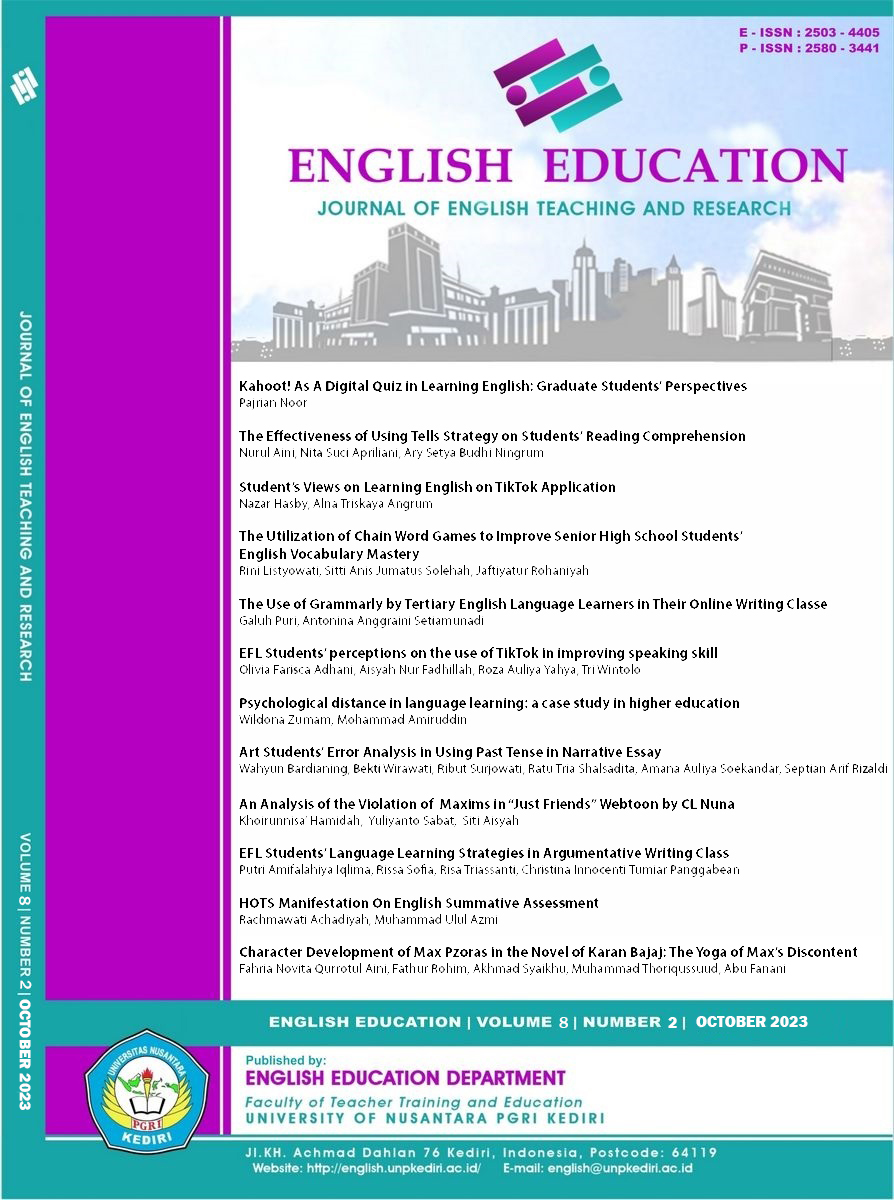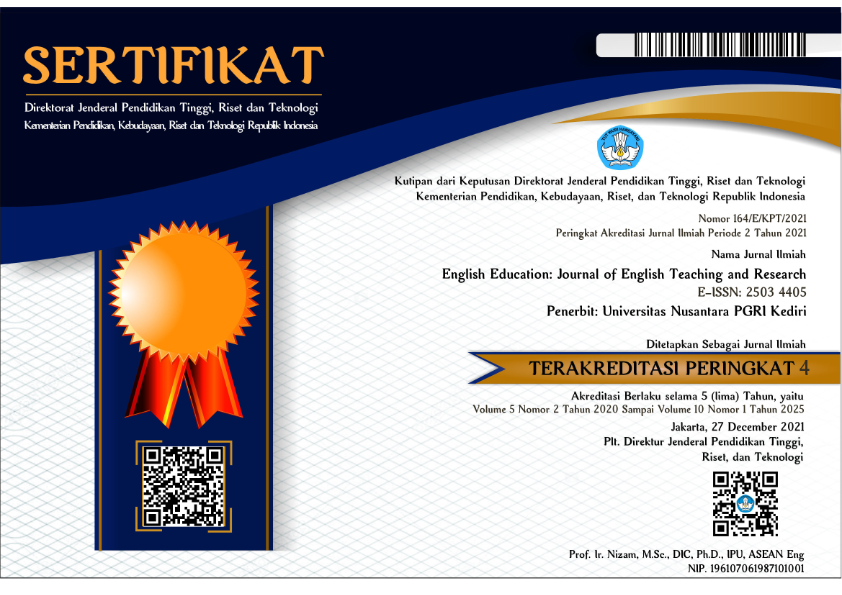Student’s Views on Learning English on TikTok Application
DOI:
https://doi.org/10.29407/jetar.v8i2.21082Keywords:
: Social media, The TikTok application, Learning English, Learning mediaAbstract
This study aims to explore students' views of the TikTok application, which can be used as a learning medium, especially learning English relevant to generation Z. This is reinforced by previous research and some experiences from several researchers. This is driven by the fact that social media is a medium that is closely related to generation Z. This study used a qualitative method to determine students' views on learning English on the TikTok application. This study used data collection and interview methods. This research was conducted on students from private universities in the first semester of the English academic year (2022/2023). Based on data obtained during interviews with several students regarding students' views on learning English in the TikTok application and the results, most participants agreed that the TikTok application could help to learn, especially learning English. Although each application has drawbacks and constraints, the TikTok application has many benefits, including learning. Furthermore, the implications of this research are closely related to learning, especially learning English, with the hope that it help students learn English modernly.
Downloads
References
Alfarisy, F. (2020). Kajian Budaya: Kebijakan Bahasa di Tengah Pandemi Covid19. Jurnal Kajian Budaya, Perpustakaan, Dan Informasi,, 343–353.
Anang Sam, C. (2016). Cara Alami Menguasai Bahasa Inggris Semudah Bahasa Indonesia. Depok: United Books Redaksi: Rivera Hills Blok B-5 No. 30 Jl. Darussaadah Cinangka Sawangan Depok.
Anggi E Pratiwi, N. N. (2018). “TikTok as Media to Enchancing the Speaking Skill of EFL Students’.” . Journal Procedings International Conferense on Education of Suryakancana, 372–82.
Anggi E Pratiwi, N. N. (2021). UTILIZING TIKTOK APPLICATION AS MEDIA FOR LEARNING ENGLISH . Proceedings International Conference on Education of Suryakancana.
Bahri, A. (2022). APLIKASI TIKTOK SEBAGAI MEDIA PEMBELAJARAN BAHASA INGGRIS DI INDONESIA. Jurnal Indonesia Sosial Sains, 2723 - 6595.
Chotijah fanaqi, r. I. (2022). Pemanfaatan tiktok sebagai media edukasi di masa pandemi covid-19. jurnal Komunikasi Universitas Garut:, 910-924.
Dr. Drs. H. Rifa'i AbuBakar, M. (2021). Pengantar Metodologi Penelitian . Yogyakarta: SUKA-Press UIN Sunan Kalijaga.
Eni Fariyatul Fahyuni, S. M. (2017). TEKNOLOGI, INFORMASI, DAN KOMUNIKASI (PRINSIP DAN APLIKASI DALAM STUDI PEMIKIRAN ISLAM). Sidoarjo: UMSIDA PRESS.
Faisal, S. (2008). Format-Format Penelitian Sosial. Jakarta: Raja Grafindo Persada.
Helaluddin, H. T. (2019). Strategi Pembelajaran Bahasa . Jurnal Pendidikan Edutama, 31.
Khan, I. A. (2018). Effect of Using PC Tablets on Perceived Learning . International Journal of Learning and Development, 21-36.
Mulyasa, E. (2011). Menjadi Guru Profesional Menciptakan Pembelajaran Kreatif dan Menyenangkan. Bandung: Remaja Rosda .
Nuari, L. P. (2022). THE INFLUENCE OF TIKTOK VIDEO ON STUDENTS’ PRONUNCIATION IN SMP NEGERI 1 PURNANEGARA. UIN Prof. K. H. Saifuddin Zuhri.
Pramudyo, G. N. (2017, Mei 25). Etika ilmiah Dan penelitian. Retrieved from Ganipramudyo.web.id.: https://www.ganipramudyo.web.id/2017/05/etika-ilmiah-dan-penelitian
Pujiono, A. (2021). Media Sosial Sebagai Media Pembelajaran. Journal of Christian Education, 1-19.
Rahayu, V. R. (2022). THE USE OF TIKTOK AS A LITERACY LEARNING MEDIUM FOR ELEMENTARY . INDONESIA JOURNAL OF MULTIDISCIPLINARY SCIENCE.
Raya, P. K. (2019). Metodologi Penelitian. In Materi I (p. 2). Palangka Raya: Pusat Bahan Ajar dan eLearning http://repo.poltekkes-palangkaraya.ac.id/2496/1/modul%20metodologi%20penelitian.pdf.
Sugiyono. (2011). Metode Penelitian Kuantitatif Kualitatif dan R&D. Bandung: Alfabeta.
Sugiyono. (2011). Metode Penelitian Kuantitatif, Kualitatif, dan Kombinasi (Mixed Methods). Bandung: Alfabeta.
Surokim. (2017). INTERNET,MEDIA SOSIAL & PERUBAHAN SOSIAL DIMADURA. Jawa Timur: Prodi Komunikasi Fakultas Ilmu Sosial & Ilmu Budaya (FISIB) Universitas Trunojoyo Madura (UTM).
Wijaya, I. W. (2022). Analisis Video Likes To Likes Rasio TikTok Pada Top 5 Vendor .
Wisnubhadra, I. (2021). INFORMATIKA. In d. Mushthofa, Informatika dan Keterampilan Generik (pp. 2-22). Jakarta Pusat: Pusat Kurikulum dan Perbukuan Badan Penelitian dan Pengembangan dan Perbukuan Kementerian Pendidikan, Kebudayaan, Riset, dan Teknologi Jalan Gunung Sahari Raya No. 4 Jakarta Pusat.
Yunisca Nurmalisa, S. (2017). PENDIDIKAN GENERASI MUDA. Yogyakarta: media akademi.
Downloads
Published
Issue
Section
License
Authors who publish with this journal agree to the following terms:
- Copyright on any article is retained by the author(s).
- The author grants the journal, the right of first publication with the work simultaneously licensed under a Creative Commons Attribution License that allows others to share the work with an acknowledgment of the work’s authorship and initial publication in this journal.
- Authors are able to enter into separate, additional contractual arrangements for the non-exclusive distribution of the journal’s published version of the work (e.g., post it to an institutional repository or publish it in a book), with an acknowledgment of its initial publication in this journal.
- Authors are permitted and encouraged to post their work online (e.g., in institutional repositories or on their website) prior to and during the submission process, as it can lead to productive exchanges, as well as earlier and greater citation of published work.
- The article and any associated published material is distributed under the Creative Commons Attribution-ShareAlike 4.0 International License








 Article template
Article template



